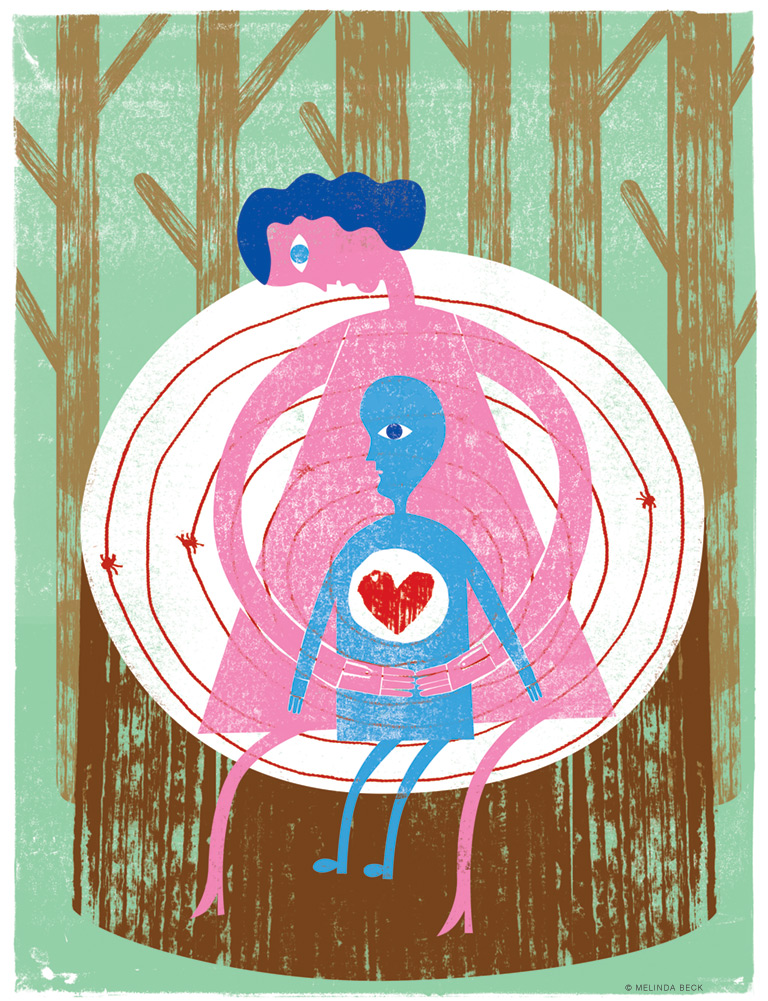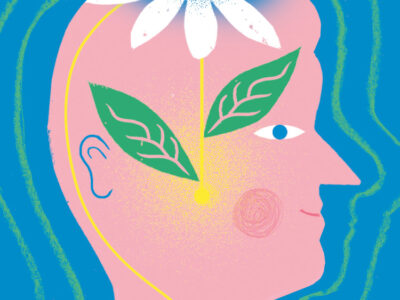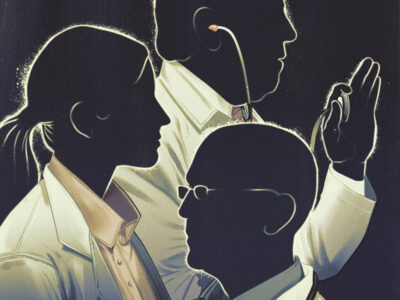
A Penn researcher and longtime parent advocate challenges the belief in an “intact mind” hidden deep inside severely autistic individuals like her son.
As a young woman Amy S.F. Lutz C’92 Gr’22 thought she “was going to write the Great American novel.” She majored in psychology and English at Penn, got an MFA elsewhere, and even published some short stories. But then her first child came along.
Jonah turned out to be severely autistic, and his enormous need for care not only changed her life but also shifted her literary focus. She noticed that cultural depictions of autism were nothing like the profound disability of her son, which had far-reaching ramifications for his parents and, eventually, four siblings. So she started writing about autism.
Her new focus brought her back to Penn, where she obtained a PhD in the history and sociology of science and wrote the dissertation that has now been published by Oxford University Press as a book, her third on autism, called Chasing the Intact Mind. The subtitle explains what she is getting at: How the Severely Autistic and Intellectually Disabled Were Excluded from the Debates That Affect Them Most.
Lutz is now a senior lecturer in Penn’s Department of History and Sociology of Science, where she teaches courses in bioethics and the history of medicine. Gazette contributor Daniel Akst C’78 asked her about her evolution as a writer, scholar, and parent engaged with autism.
Your new book is called Chasing the Intact Mind. Who’s doing the chasing and what exactly is being pursued?
The “intact mind” is an assumption that’s very prevalent in autism discourse, specifically that there is a typical or superior intelligence deep inside people who present as being profoundly cognitively impaired. This view is based on the assumption that there’s no such thing as severe cognitive impairment. Rather, there are just people in the autism community whose minds are inaccessible for different reasons. And I approach this both as a historian of medicine with a focus on the history and ethics of autism and intellectual disability, and as a longtime parent advocate for my severely autistic son.
What’s his situation?
Jonah is 24, but he still lives with us. He has no abstract language. He can’t answer any kind of question that begins with why or how. He still sucks his thumb and loves Sesame Street. We’ve managed to get beyond his most challenging behaviors, which were dangerous to him and others, and get him medically stabilized, but he is always going to require round-the-clock supervision. It’s taken me a long time, but I’ve come to peace with the fact that there’s no intact mind inside my son, and I’ve come to accept and love him the way he is.
You assert that the intact mind is a chimera. Is it primarily desperate parents clinging to this hope?
I don’t think there’s ever been a parent who hasn’t invested all their hope in the intact mind at some point, because I don’t think that there’s anything more important than the hope that our kids can grow up to live what philosophers would call the good life. We want our kids to grow up to be independent, we want them to have a meaningful career, maybe go to college, travel, have reciprocal romantic relationships, enjoy talking about politics or philosophy or theater, literature, whatever. And all of that is foreclosed for my son.
Your book shows that the intact mind is a trope in a genre of parental memoirs that began appearing in the 1960s.
I read about 80 of these autism parent memoirs. And it was just so striking that from 1967 right to the present, the intact mind assumption is extremely strong throughout.
But it’s not just the parents.
A huge driver of this intact mind assumption now are the neurodiversity advocates. Neurodiversity is a branch of the disability rights movement that’s largely focused on people with autism. Sometimes they include ADHD or OCD, but the typical neurodiversity advocate is almost certainly a very, very mildly affected autistic adult. This intact mind narrative is perpetuated to control the services and supports that are available to people with autism—and by expansion, other types of intellectual and developmental disabilities. And because the neurodiversity movement is so invested in this idea that autism is an identity, not a disorder, I think people like my son, who are so obviously very disabled, pose enormous problems.
Does this account for the resurgence of “facilitated communication?”
It’s parents and activists both. Facilitated communication was roundly disproven in the mid 1990s. It’s basically a form of ventriloquism in which a non-disabled facilitator is controlling the words spelled out by a profoundly intellectually disabled person through a combination of physical support and subtle psychological cues. The closest example might be like a Ouija board, where that’s also controlled by what’s known as ideomotor effects: very small unconscious movements that we’re all subject to. It’s been thoroughly discredited, yet it’s back now. Nothing is more predicated on the intact mind than facilitated communication because the whole enterprise hinges on this idea that there is a normal or even genius-level intellect trapped inside.
When and how did this idea of the intact mind arise?
I trace it to the mid-20th century, when autism was considered not an intellectual disability, not a developmental disability like it is today, but a psychiatric disturbance closely related to childhood schizophrenia—and therefore subject to the same types of psychiatric theorizing, which was heavily dominated by psychoanalysis. Psychoanalysts thought all psychiatric disturbance was caused by childhood trauma. And of course, who’s responsible for childhood trauma? Typically, it’s the parents. And so sometimes psychoanalysts argued that parents caused psychiatric disturbance by being too smothering.
But in autism, it becomes the opposite claim—that it was cold parenting, especially cold mothers or “refrigerator mothers” who cause autism. But if bad parenting is causing psychiatric disturbance in children who were born normal, there’s always the hope that with proper treatment you can recover those children. And so that was kind of the consensus between the psychiatric profession and the parents, who bought into this because they wanted to cure their children.
Surely this point of view no longer prevails.
No. In the 1980s a biological or medical model of autism becomes ascendant. Psychoanalysis is out, and you have [people] saying children are born with autism and it’s not the fault of parents, but also that there’s not much you can do to cure autism. You would think the parents would feel vindicated, but actually they don’t really like this new version either—because it really forecloses the future for their kids.
And that’s what you saw in the case of Jonah.
It was obvious that the autism that he had was not the autism that was being talked about in the media. We had Sheldon from The Big Bang Theory. We had The Curious Incident of the Dog in the Night-Time. You had this quirky genius model of autism. On the news, they would showcase autistic kids shooting a basket in a basketball game or singing with Katy Perry or whatever. But this is not the autism in my house.
And so I started writing about life at the severe end of the spectrum, because I wanted to shine a light on our kind of autism and make sure that Jonah wasn’t left out of the discourse. I was accused of being ableist, of hating my son and violating his privacy. As soon as my other kids got old enough to Google me, they wanted to know why does it say that Amy Lutz hates autistic people? They saw that my entire life was wrapped up in autism care and advocacy. I decided that I really wanted a better understanding of how we got to this place where the autism community was so fraught.
So that’s why I went back to school at Penn. It was a fabulous experience and then I just was incredibly lucky to be able to slide into an open faculty position at Penn, which allowed me to stay here because I love this department. And I love the students at Penn.
And you’ve done all this with four children in addition to Jonah.
I have an incredibly supportive husband who works at home and is very hands-on with Jonah. They do all the shopping together. My husband does all the cooking. That’s quite different from the story that you hear coming out of severe autism families, where it’s the mom doing everything at home while the dad is out working. Or the dad just bolts. That’s a really common story because it’s a very stressful circumstance.
You note that two of the earliest relevant parental memoirs aren’t directly about autism but were by famous and widely revered women.
One was by the writer Pearl Buck, whose daughter Carol had phenylketonuria. The other was by the actress and singer Dale Evans, whose husband was the cowboy star Roy Rogers. Their daughter Robin had Down Syndrome and died at the age of two. They were breakthrough books at a time when this sort of thing was hushed up as a source of shame, because the authors model really positive ways of speaking about their intellectually disabled children that don’t involve intact minds. I just wanted to show that treating these children with humanity and empathy and valuing them and loving them doesn’t require assuming an intact mind. There are ways to write about their importance and their human value without doing that.




